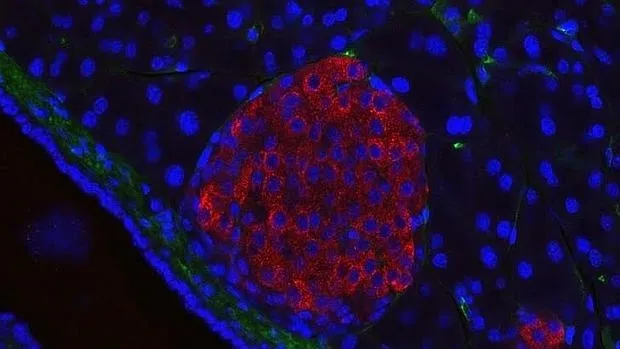In study led by researchers from the University of Leuven (Belgium) shows a common genetic defect for both types of diabetes that could open the door to new treatments for type 2.
As Adrian Liston, director of this research published in the magazine "Nature Genetics" explains, "our results show how genetics play a critical role in the survival of the beta cells of the pancreas, that is, the cells responsible for insulin production.
And according to their genotype, people can have more resistant and robust beta cells, while others have very fragile beta cells and that cannot endure stress.And these last people are those that develop diabetes, either type 1 or 2, while the former remain ‘healthy’ although they suffer an autoimmune process (type 1) or a metabolic dysfunction of the liver (type 2) ».
more genetic than environmental?
In the study, the authors investigated the genetic variants involved in the development of diabetes.And for this, and contrary to how many previous investigations have done, they did not focus on the genetic effects that alter the immune system - the alteration causes the immune system itself to destroy the beta cells, the type 1 diabetes appears - or cause theMetabolic dysfunction of the liver - as a result of this dysfunction, insulin and liver resistance occurs stops capturing glucose, which happens in type 2 diabetes, but focused on the genes of the pancreatic beta cells themselves.
The researchers used an animal model - trays - genetically modified.And what they observed is that those mice whose beta cells had a low or no ability to repair the damage in their DNA quickly developed the disease when their beta cells were subjected to cellular stress.On the contrary, animals with beta cells capable of repairing their genetic content did not develop diabetes or in extreme conditions of cell stress.More;The fragility or robustness of beta cells was also found in the analysis of human beings tissues with or without diabetes, indicating that the genetic predisposition to have ‘fragile’ beta cells would explain the appearance of the disease.
Genetics plays a critical role in survival of beta cells of the pancreasadrian liston
So, is the risk of diabetes a merely genetic issue in which environmental factors do not influence?No. As Adrian Liston indicates, «While genetics is the most important factor for the development of diabetes, our environment, in the case of our food, also plays a decisive role.And even mice with ‘superior’ beta cells ended up suffering from the disease when we increased the amount of fats in their diets ».
drugs for type 2 diabetes
The new treatment, according to the authors, could facilitate the development of new treatments for type 2 diabetes even in the late phases of the disease - this is, in which pancreatic beta cells stop producing insulin definitively.Not surprisingly, highlights Lydia Makaroff, of the International Diabetes Federation (IDF), regarding the results, “today we do not have effective treatments for the late phases of type 2 diabetes. And we desperately need them.But this study improves in a very substantial way our understanding of type 2 diabetes, which will allow the design of better strategies and drugs for diabetes in the future ».
As Adrian Liston refers, «the big problem in the development of drugs for the late phases of type 2 diabetes is that so far we did not have animal models for the phases in which it occursThe death of beta cells.In fact, previous models have always been based on the initial phases of liver metabolic dysfunction, which has made it possible to develop good drugs to treat the initial stages of the disease ».
And in this context, the study director concludes, «our model with mice allows, for the first time, to test the new antidiabetic drugs that act on beta cells that have not yet been destroyed.There are many promising drugs already in development that only needed an animal model in which to be tested.And who knows, there are equal compounds hidden among traditional medicines that could be discovered with the use of our model in clinical trials ».
on diabetes
Diabetes is a disease that suffers from about 400 million worldwide - and more than 6 million Spaniards - and that only in 2014 was directly responsible for 4.9 million deaths globally.A disease that, fundamentally, is divided into all types: type 1 diabetes, which usually develops in the second decade of life and in which there is no insulin;and type 2 diabetes, which represents 80-85% of the cases of diabetes and that, commonly associated with obesity, is characterized that insulin does not occur in sufficient amounts or is not correctly used.Therefore, and in addition to the notable differences in environmental factors - diabetes has been defined as a ‘lifestyle disease’ - it can be assumed that both types have a very unequal genetic basis.


